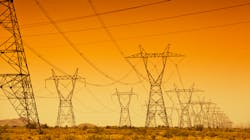Biden-Harris Administration Approves Clean Energy Transmission Project in Arizona, California
The Biden-Harris administration this week announced the Interior Department’s approval for construction of the Ten West Link Transmission Line project, which will facilitate increased renewable energy development and delivery in Arizona and California. The project represents another significant milestone in efforts to lower consumers’ energy costs and modernize America’s power infrastructure in the West by permitting at least 25 gigawatts of solar, wind and geothermal production on public lands by 2025.
The Ten West Link route traverses a region with some of the highest potential for utility-scale solar photovoltaic energy development in the nation. The project will provide critical transmission infrastructure to support the development of future utility-scale solar energy resources and will boost the reliability of the bulk power system for millions of customers in Central Arizona and Southern California.
“Approving this new transmission line on our public lands will accelerate our nation’s transition to a clean energy economy by unlocking renewable resources, creating jobs, lowering costs, and boosting local economies,” said Secretary Deb Haaland. “Through robust engagement with states, cities and Tribes, the Interior Department is committed to diversifying the nation’s renewable energy portfolio while at the same time combatting climate change and investing in communities.”
The Bureau of Land Management’s (BLM) Notice to Proceed authorizes Delaney Colorado River Transmission, LLC, to begin construction of the 125-mile, 500-kilovolt transmission line that will connect existing substations near Tonopah, Arizona and Blythe, California.
“BLM Arizona worked closely with a variety of stakeholders and carefully considered their input in order to develop the best possible route,” said BLM Arizona State Director Ray Suazo. “Through this close collaboration, we developed a route that will help meet our region’s energy needs while avoiding impacts to military readiness and operations, local communities, popular recreation areas, the Kofa National Wildlife Refuge and Tribal lands.”
The Ten West Link Transmission Line is an infrastructure project covered under Title 41 of the FAST Act (FAST-41). Through the Federal Permitting Improvement Steering Council, the BLM coordinated reviews with other agencies, including the National Park Service, U.S. Fish and Wildlife Service, Advisory Council on Historic Preservation, Council on Environmental Quality, Department of Defense (including leadership at the U.S. Army’s Yuma Proving Grounds and the Military Aviation and Installation Assurance Siting Clearinghouse), as well as Tribal leadership and local communities, to make a timely and informed project decision.
The plan follows the Record of Decision based on the 2019 final environmental impact statement and approved amendments to the BLM Yuma Field Office Resource Management Plan and California Desert Conservation Area Plan. Scoping for the project began in March 2016 and the draft environmental impact statement was released in August 2018. The final environmental impact statement analyzed several alternatives and selected a 125-mile-long route mostly located in existing utility corridors or parallel to existing infrastructure. Additional information, including the National Environmental Planning Documents, are available on ePlanning at the Ten West Link web page.
The BLM is currently processing 64 utility-scale onshore clean energy projects proposed on public lands in the western United States. This includes solar, wind and geothermal projects, as well as interconnect gen-tie lines that are vital to clean energy projects proposed on non-federal land. These projects have the combined potential to add over 41,000 megawatts of renewable energy to the western electric grid. The BLM is also undertaking the preliminary review of 90 applications for solar and wind development, as well as 51 applications for wind and solar energy testing.
The approval of the Ten West Link project follows recent approvals for construction of the Oberon, Arica and Victory Pass solar projects near Desert Center in eastern Riverside County. The Oberon project will generate up to 500 megawatts of renewable energy, enough to power approximately 146,000 homes, and includes 200 megawatts of battery storage. The Arica and Victory Pass projects will result in a combined infrastructure investment of about $689 million, generate $5.9 million in annual operational economic benefit, provide power to approximately 132,000 homes, and add up to 465 megawatts of clean energy generating capacity and 400 megawatts of battery storage.
